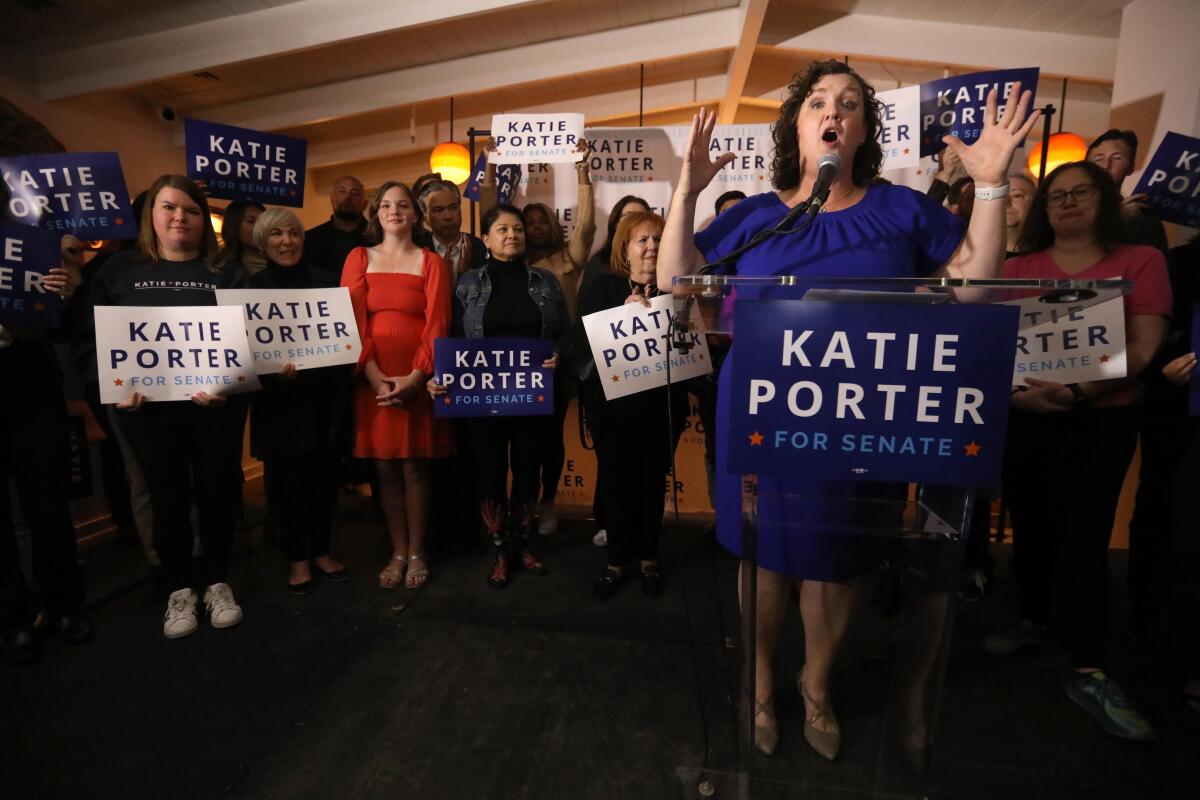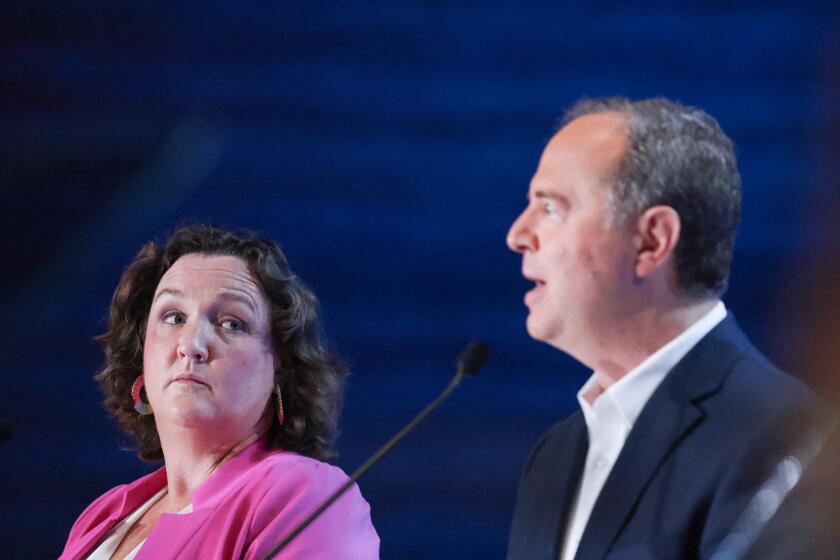Rep. Katie Porter says she regrets calling the California Senate primary ‘rigged’

- Share via
The outspoken Rep. Katie Porter is cleaning up after a controversial comment she made in the aftermath of her California Senate primary loss to fellow Democrat Rep. Adam Schiff and Republican Steve Garvey.
Days after the March 5 primary, when it became clear she wouldn’t win, Porter tweeted a thanks to her supporters accompanied by a dig.
“Because of you, we had the establishment running scared — withstanding 3 to 1 in TV spending and an onslaught of billionaires spending millions to rig this election,” Porter wrote on X, formerly known as Twitter.
Democratic leaders denounced Porter’s comments for echoing the rhetoric of former President Trump, the current front-runner for the 2024 Republican presidential nomination, who has falsely claimed that the 2020 presidential election was stolen by President Biden.
In falsely claiming California’s primary was rigged, Katie Porter is emulating Donald Trump and recklessly undermining faith in our embattled elections system.
Some of the sharpest criticism came from California Sen. Alex Padilla, a Democrat and the state’s former chief elections officer. Normally reserved, Padilla told POLITICO: “I can assure you of the integrity of the elections and the results.” The pile-on continued and some said this could tank her chances of running for office in the future.
In an appearance on Pod Save America, Porter sounded somewhat chastened but remained defiant about a larger point.
“Obviously, I wish I had chosen a different word, because what happened with the controversy was it took away from two really important truths,” the Irvine congresswoman told the hosts.
Porter said she thought “California election officials do a terrific job” and that she had “tremendous respect for them.”
Her mea culpa ended there and she went on to say that a larger point got lost in the uproar, which was about the influence of money in politics. Over the final month of the election, Porter bashed a network of tech investors and cryptocurrency interests who poured $10 million into advertising bashing the Irvine congresswoman.
She also lambasted Schiff for spending tens of millions of dollars in campaign funds to boost the profile of Garvey, a former baseball player, by saying “he was too conservative for California.” These ads had the effect of helping the former Padres and Dodgers baseball star to consolidate support among the smaller but still significant number of Republicans in the state, which proved to be enough for him to leapfrog prominent Democratic rivals like Porter and Rep. Barbara Lee of Oakland.
“Big money does influence our elections. Outcomes are manipulated and distorted,” Porter said.
“When you have people coming in spending millions and millions of dollars at the last minute, and that money is not disclosed until after the election. So people don’t know about it.”
One official from Coinbase, which has the highest trading volume of any cryptocurrency exchange in the U.S., previously told The Times that they are backing candidates who “think about crypto as an opportunity to really make a difference to change, to protect jobs, to protect national security.”
The cryptocurrency sector is back in the political arena, deploying its cash reserves in the 2024 election cycle, including California’s U.S. Senate race.
Porter lamented in the podcast that her views of currency exchanges and blockchain technologies weren’t discussed more openly even as these groups perceived her as skeptical of the industry. A voter guide prepared by Stand With Crypto — a political 501(c)4 nonprofit organization that is not required to disclose its donors — described Schiff as “strongly supportive” of crypto and Porter as “strongly against.”
Porter’s low marks were based on a tweet about “shadowy crypto billionaires,” a letter she signed that questioned the Texas power grid authority’s practice of paying crypto mining businesses to shut off power during peak periods. The nonprofit also said she opposed a bill the cryptocurrency industry favored even though her office later said she had never taken a position on the legislation.
“20% of Americans may have some kind of crypto assets. Congress has been grappling with this. But, you know, true to its motto, solving yesterday’s problems tomorrow, Congress has not done anything about it yet,” Porter told the podcast hosts.
“So what’s unfortunate and what I think when I say sort of this race was manipulated by this spending is it wasn’t spending to create a debate about policy issues.”
Times staff writer Laura J. Nelson contributed to this report.
More to Read
Sign up for Essential California
The most important California stories and recommendations in your inbox every morning.
You may occasionally receive promotional content from the Los Angeles Times.













